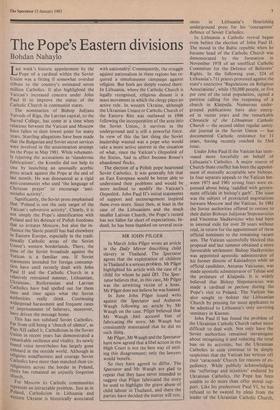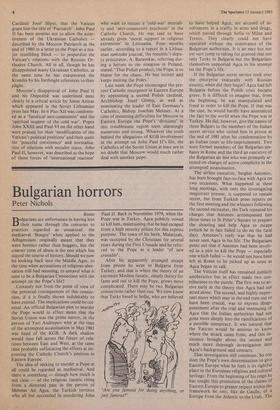The Pope's Eastern divisions
Bohdan Nahaylo
T ast week's historic appointment by the 1.4 Pope of a cardinal within the Soviet Union was a 'fitting if somewhat overdue tribute to the country's estimated seven million Catholics. It also highlighted the Vatican's increased concern under John Paul II to improve the status of the Catholic Church in communist states.
The nomination of Bishop Julijans Vaivods of Riga, the Latvian capital, to the Sacred College, has come at a time when relations between the Vatican and Moscow have fallen to their lowest point for many years. Startling allegations have been made that the Bulgarian and Soviet secret services were involved in the assassination attempt on the Pope in May 1981. While vehement- lY rejecting the accusations as 'slanderous fabrications', the Kremlin did not help its case by launching an unusually acerbic press attack against the Pope at the end of last month. He was denounced as a rigid anti-communist who used 'the language of Christian prayer' to encourage anti- socialist activity'.
Significantly, theSoviet press emphasised that 'Poland is not the only target of the Vatican's subversive activity'. Clearly, it is not simply the Pope's identification with Poland and his defence of Polish freedoms that so irritates Moscow, but also the in- fluence the Slavic pontiff has had elsewhere in Eastern Europe, especially in the tradi- tionally Catholic areas of the Soviet Union's western borderlands. There, the tone of the Soviet broadside against the Vatican is a familiar one. If Soviet statements intended for foreign consump- tion have until recently dealt with John Paul II and the Catholic Church in a relatively restrained manner, Lithuanian, Ukrainian, Byelorussian and Latvian Catholics have had spelled out for them time and time again what the Soviet authorities really think. Continuing widespread harassment and frequent cases of imprisonment of believers, moreover, have driven the message home.
This has not subdued Soviet Catholics. Far from still being a 'church of silence', as Pius XII called it, Catholicism in the Soviet Union in recent years has demonstrated a remarkable resilience and vitality. Its newly found voice nevertheless has largely gone Unheard in the outside world. Although in religious steadfastness and courage Soviet Catholics have more than matched their co- religionists across the border in Poland, theirs has remained an unjustly forgotten church.
For Moscow its Catholic communities represent an intractable problem. Just as in Poland, Catholicism in Lithuania and western Ukraine is historically associated
with nationality. Consequently, the struggle against nationalism in these regions has re- quired a simultaneous campaign against religion. But both are deeply rooted there. In Lithuania, where the Catholic Church is legally recognised, religious dissent is a mass movement in which the clergy plays an active role. In western Ukraine, although the Ukrainian Uniate or Catholic Church of the Eastern Rite was outlawed in 1946 following the incorporation of the area into the Soviet Union, it survives in the underground and is still a powerful force. In view of this the last thing the Soviet leadership wanted was a pope who would take a more active interest in the situation of what, since the Vatican's Ostpolitik of the Sixties, had in effect become Rome's abandoned flocks.
The election of a Polish pope heartened Soviet Catholics. It was generally felt that an East European would be better able to understand their problems and would be more inclined to modify the Vatican's Ostpolitik. John Paul II's initial statements of support and encouragement inspired them even more. Since then, at least in the case of the Lithuanians and the much smaller Lativan Church, the Pope's record has not fallen far short of expectations. In- deed, he has been thanked on several occa-
sions in Lithuania's flourishing underground press for his 'courageous' defence of Soviet Catholics.
In Lithuania a Catholic revival began even before the election of John Paul II. The mood in the Baltic republic when he became head of the Catholic Church was demonstrated by the formation in November 1978 of an unoffical Catholic Committee for the Defence of Believers' Rights. In the following year, 524 of Lithuania's 711 priests protested against the state's restrictive 'Regulations on Religious Associations', while 150,000 people, or five per cent of the total population, signed a petition calling for the reopening of a church in Klaipeda. Numerous under- ground publications have also emerg- ed in recent years and the remarkable Chronicle of the Lithuanian Catholic Church — the second oldest regular satniz- dat journal in the Soviet Union — has documented Catholic resistance for II years, having recently reached its 53rd issue.
Under John Paul II the Vatican has inter- vened more forcefully on behalf of Lithuania's Catholics. A major source of Church-State conflict has been the appoint- ment of mutually acceptable new bishops. In four separate appeals to the Vatican bet- ween 1975 and 1981 strong fears were ex- pressed about being 'saddled with govern- ment officials in bishop's garb'. The issue was the subject of protracted negotiations between Moscow and the Vatican. In 1981 the Soviet authorities offered to restore to their duties Bishops Julijonas Steponavicius and Vincentas Sladkevicius who had been in internal exile for over 20 years without trial, in return for the appointment of three official nominees to the remaining vacant sees. The Vatican successfully blocked this proposal and last summer obtained a more favourable settlement: Bishop Sladkevicius was appointed apostolic administrator of his former diocese of Kaisiadorys while an official candidate, Antanas Vaiciunas, was made apostolic administrator of Telsiai and the prelature of Klaipeda. It is widely believed that Bishop Steponavicius was made a cardinal in pectore during the Pope's visit to Poland. The Vatican has also sought to bolster the Lithuanian Church by pressing for more applicants to be admitted to Lithuania's only surviving seminary in Kaunas.
John Paul II has found the problem of the Ukrainian Catholic Church rather more difficult to deal with. Not only have the Soviet authorities remained intransigent about recognising it and reducing the total ban on its activities, but the Ukrainian Catholics in exile continue to be deeply suspicious that the Vatican has written off their 'catacomb' Church for reasons of ex- pediency. While publicly acknowledging the 'sufferings and injustices' endured by Ukrainian Catholics, the Pope has been unable to do more than offer moral sup- port. Like his predecessor Paul VI, he has refused to be swayed by pleas from the leader of the Ukrainian Catholic Church,
Cardinal Josef Slipyi, that the Vatican grant him the title of 'Patriarch'. John Paul II has been anxious not to allow the asser- tiveness of the Ukrainian Catholics described by the Moscow Patriarch at the end of 1980 in a letter to the Pope as a ma- jor stumbling block — to jeopardise the Vatican's relations with the Russian Or- thodox Church. All in all, though he has disappointed many Ukrainian Catholics, at the same time he has exasperated the Kremlin by his forthright references to their plight.
Moscow's disapproval of John Paul II and his Ostpolitik was underlined most clearly in a critical article by Jonas Anicas which appeared in the Soviet Lithuanian press last May. In it Pius XII was condemn- ed as a 'fanatical anti-communist' and the 'spiritual inspirer of the cold war'. Popes John XXIII and Paul VI on the other hand were praised for their 'modification of the Vatican's political positions' and their quest for 'peaceful coexistence' and normalisa- tion of relations with socialist states. John Paul II, however, was described as the hope of those forces of 'international reaction' who want to restore a 'cold-war' mentali- ty and 'anti-communist psychosis' in the Catholic Church. He was said to have already given 'moral support to religious extremism' in Lithuania. Four months earlier, according to a report in a Lithua- nian sumizdut journal, the republic's depu- ty procurator, A. Barauskas, referring dur- ing a lecture to the situation in Poland, stated: 'That Polish product, the Pope, is to blame for the chaos. He has incited and keeps inciting the Poles.'
Last week the Pope encouraged the pre- sent Catholic resurgence in Eastern Europe by appointing a second Polish cardinal, Archbishop Jozef Glemp, as well as nominating the leader of East Germany's Catholics, Bishop Joachim Meisner. At a time of mounting difficulties for Moscow in Eastern Europe the Pope's 'divisions' in this troublesome region seem alarmingly numerous and strong. Whatever the truth behind the allegations of KGB involvement in the attempt on John Paul II's life, the Catholics of the Soviet Union at least are in no doubt that Moscow would much rather deal with another pope.







































 Previous page
Previous page